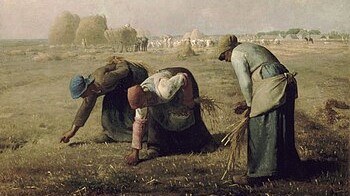Revelation 13: 11-18
What does Don McClean’s hit song, “American Pie,” have in common with the book of Revelation?
They are both aimed at very particular groups of people. People who have been steeped in a culture common to them and them alone. They both make many references to symbols that their intended audience would immediately understand but that would be completely opaque to someone outside of that culture.
In her most recent book, Facing The Beast, author Naomi Wolf does not cite directly to the book of Revelation or to the beasts that are described in that book but it is undeniable that the beast she describes there is the very same one that Saint John describes in the New Testament book of Revelation. It is hard to imagine that she did not have that in mind as she came up with a title for her book.
What do we know about the beasts that Saint John describes in this least read and most widely misunderstood book of the Bible? First, we know that they are evil. They derive their power from the Dragon (chapter 12) who is expressly identified as Satan, that power who “makes war. . . against those who obey God’s commandments and hold to the testimony of Jesus” (12:17). Thus, the beast was given “power to make war against the saints and to conquer them.” (13: 7)
The second beast, the land beast, also deriving its power from Satan, “deceived the inhabitants of the earth,” and:
Revelation 13:16-17
New International Version
16 It also forced all people, great and small, rich and poor, free and slave, to receive a mark on their right hands or on their foreheads, 17 so that they could not buy or sell unless they had the mark, which is the name of the beast or the number of its name.
Thus, the two dynamics to which Saint John points in this image he gives us in chapter 13 are these: deception and coercion. And, particularly, coercion by means of exclusion or ostracism, the idea of being left out. In the picture John paints, the beast excludes those who refuse to bear his mark from all commerce. If you cannot buy or sell, you are cut off from life, you cannot survive.
In Wolf’s book, she cites to the several instances in her life and in the lives of many around her where she or others were shut off from commerce or, more broadly, the flow of normal life, when they refused to be vaccinated. In her own case, she was prohibited from eating in restaurants. In other cases, unvaccinated students were prohibited from attending classes. We know that NBA players and championship tennis players were not allowed onto the courts without proof of vaccination. (Kyrie Erving) (Novak Djokovic)
So much for exclusion or coercion. Now to the other dynamic, that is, deception. Naomi Wolf argues that a great deal more was known about the vaccines than was actually disclosed to the public at the time the vaccination push was underway. She argues that:
- · the fact that the vaccines had not been tested in the way that other drugs had to have been before being placed on the market was either hidden or soft pedaled during the rollout campaign;
- · more was known about the widespread and often serious harms associated with the injections than was admitted (blood clots, heart problems, effects on women’s reproductive systems)
- · when it became more and more obvious that the vaccines did not prevent contraction of the disease, did not prevent transmission of the disease, and did not reduce the severity of the disease, or diminish the likelihood of hospitalization or death, efforts were made to keep these facts hidden; and
- · efforts were made and were effective to remove any dissent from the official narrative from all public discourse (Facebook, Twitter, etc) Those who were deplatformed included not only journalists like Wolf and Alex Berenson, but medical doctors who were at the top of their fields. (cites )
In Revelation, we see two evil beasts, both with the goal of diminishing humanity, who work in concert with each other:
Revelation 13:11-15 New International Version
11 Then I saw a second beast, coming out of the earth. It had two horns like a lamb, but it spoke like a dragon. 12 It exercised all the authority of the first beast on its behalf, and made the earth and its inhabitants worship the first beast, whose fatal wound had been healed. 13 And it performed great signs, even causing fire to come down from heaven to the earth in full view of the people. 14 Because of the signs it was given power to perform on behalf of the first beast, it deceived the inhabitants of the earth. It ordered them to set up an image in honor of the beast who was wounded by the sword and yet lived. 15 The second beast was given power to give breath to the image of the first beast, so that the image could speak and cause all who refused to worship the image to be killed.
The beasts to which Naomi Wolf refers are the government, the drug companies and the media, all of which worked in concert to coerce and to “deceive the inhabitants of the earth.”
Some will say that this comparison I have made here goes too far. It’s off base. Saint John is talking about spiritual evil and Naomi Wolf, at very best, is talking about secular politics. These are not the same. But Ms. Wolfe herself, once a strict secularist, would disagree:
What we lived through from 2020 to 2022 was so sophisticated, so massive, so evil, and executed in such inhumane unison, that it could not be accounted for without venturing into metaphysics.
I shared earlier that I started to believe in God in more literal terms that I had before, because this evil was so impressive; so it must be directed at something at least as powerful that was all good.
The Sunday School is not the place for partisan arguments. So, rather than focusing here on what Naomi Wolf claims to be true in terms of current events, we must think about this book in terms of a personal conversion. Not from strict unbelief to Christianity, but from a completely secular and materialist viewpoint (all that is real can be seen and measured) to one that recognizes the reality of the spiritual world and the idea – consistent with Biblical theology – that there are real, supernatural powers at work in the world that are bent on evil. That is, their goal is to diminish and enslave humanity, to spread chaos.
The dynamic we see in the life of Ms Wolf is that same spiritual dynamic recognized and explained by David Walsh in his profound and hopeful and widely ignored book, After Ideology, first published in 1990. In that book, Walsh argues that the hope for a restoration of order must rest at least in part in the discovery – through the living of life – that the road western society is on – the road of materialism and secularism – is a road that goes nowhere. The idea that humanity can by itself establish order and morality is an idea that the horrors of the twentieth and now twenty-first centuries has torn to shreds.
If we are to survive and thrive as human beings, if we are not to descend into chaos and slavery, we must recognize that morality – the idea of right and wrong – is not defined by the majority of the electorate or by the opinions of the educated elites. Morality is defined by the character of God.
Moreover, our consideration of Naomi Wolf’s conversion story and her analysis of the state of the modern world in supernatural and spiritual terms can bring us right back into a very Sunday School kind of thing. It can teach us something about how to read the Bible and more particularly, how to read the book of Revelation.
Although she does not directly say so herself, her book title hints at, and her analysis closely follows a time honored and classical interpretation of the book.
In his excellent commentary on the book of Revelation, The Returning King, Bible scholar Vern Poythress writes that there are generally four schools of interpretation of the book:
Four main approaches or schools of interpretation have developed over the centuries. Preterists think that fulfillment occurs in the fall of Jerusalem (if Revelation was written in 67-68 A.D.) and/or the fall of the Roman Empire. Futurists think that fulfillment occurs in a period of final crisis just before the Second Coming. Historicists think that 6:1-18:24 offers a basically chronological outline of the course of church history from the first century (6:1) until the Second Coming (19:11). Idealists think that the scenes of Revelation depict not specific events but principles of spiritual war. The principles are operative throughout the church age and may have repeated embodiments.
Thus, whether Naomi Wolf is explicit about it or not, her book, her interpretation of current events in terms of spiritual warfare, would put her clearly in the idealist school. The Beast she faces is the same beast that the first century Christians to whom John originally wrote faced. It is the embodiment of dark spiritual power that aims at the deception, enslavement of humanity, and the destruction of all that is good, all that is humane. This beast has been organized and operative repeatedly throughout history.
That is, to say the least, interesting and of some value to us as Bible students. But what is the real lesson here? What does this work of Naomi Wolf, as seen alongside these passages of scripture have to tell us in practical terms? How can it change the way we live our lives? How can it improve our living?
For that, let us go back directly to our text. Saint John tells us that the beast leaves a mark on everything he touches. That mark is a number 666. You could fill a library with the efforts of wild-eyed commentators who have undertaken to derive the meaning of that number, as if it is some sort of Davinci code that will reveal the real meaning of the passage.
But for our purposes this morning, let’s not speculate on numbers, let’s look at the general dynamics of the text and the plain and simple instructions that God’s spirit gives to the first century Christians and to you and me:
Revelation 13:18
New International Version
18 This calls for wisdom. Let the person who has insight calculate the number of the beast, for it is the number of a man.[a] That number is 666.
Here is Eugene Peterson in his book, Reversed Thunder:
Saint John expects the deceit of the land beast to be penetrated by the Christian mind: hard, critical thinking
How do we protect ourselves from organized deceit? Saint John is blunt; use your heads. Figure out what is going on.
…the land beast can be figured out. Thus, the larger than life political world is reduced to manageable terms. The Christian, with Saint John’s help, is not overwhelmed by big government, by sensational religion, by gigantic threats, by colossal odds, by breathless claims. The temptation to use the methods of satan to counter the force of satan is considerably weakened. The lies of the enemy, clever as they are, are not so clever that they cannot be found out.
Use your head – all of your critical faculties. Get the beast’s number!


